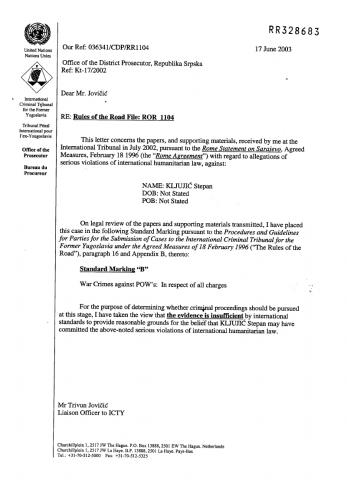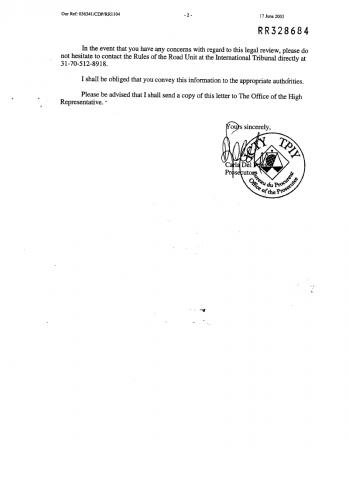Serbians Behead Elites of Bosnia-Herzegovina
Institute for the Research of Genocide Canada
Published: March 30, 2010
In the continuation of the research “Serbia and Republika Srpska with joined forces against Bosnia and Herzegovina”, published on 8 March 2022 (link), and in connection with the Ejup Ganić (the former member of the Presidency of Bosnia and Herzegovina) case, which is taking place before British jurisdiction on Serbia’s request, the IFIMES International Institute is announcing the newest facts and reasons why there are more than 10.000 incriminated Bosnians and Herzegovinians in Belgrade and in Sarajevo before the prosecutions of Serbia and Bosnia and Herzegovina.
JURČEVIĆ AND CADMAN AGAINST BOSNIANS AND HERZEGOVINIANS
Marinko Jurčević, the former Prosecutor General of Bosnia and Herzegovina, and Toby M. Cadman who carried out many important tasks for the International Community in Bosnia and Herzegovina from 2002 to 2008 (Prosecution of BiH, OHR, The Court of Bosnia and Herzegovina) are directly responsible for the incrimination of 10.000 patriotically oriented Bosnians and despite negative results of the Hague Prosecution concerning the responsibility of the Bosnian leadership, they have initiated investigations against them. Jurčević and Cadman wrote “The Rules for Reviewing War Crimes” of the Bosnian Prosecution under No. KTA-RZ 47/04-1 dated 28 December 2004, with which they incriminated Bosnians and Herzegovinians who had not been accused by the Hague Prosecution due to the lack of substantial proof according to international standards. It is symptomatic that Toby M. Cadman is currently the representative of the United Kingdom and Serbia in the Ganić case.
When the Prosecutor’s Office of the Hague Tribunal transferred 846 cases to the Bosnian Prosecution in 2004, for which the Hague Tribunal Prosecution assumed it had enough proof according to international standards, it was expected that the above 846 so-called “A” cases would be the priority for the Hague Tribunal. Estimations of international experts regarding these cases, all 846 of them, were that these cases which were separated during the 8-year work following the “Rome Rules of the Road” and marked as a priority for criminal processing in Bosnia and Herzegovina, would take 30 years at best to be completely resolved. Obviously Marinko Jurčević and some representatives of the international community in Bosnia and Herzegovina didn’t share the same opinion. The main prosecutor of Bosnia and Herzegovina at the time, Marinko Jurčević created, with help and advice of Toby M. Cadman, who is currently representing interests of Serbia in the Ganić case in the name of British jurisdiction before the court in London, an internal statute of Bosnian Prosecution, also known as “Rules on the Examination of War Crime Material”, which annihilated 8 years of work of the Hague Tribunal. Under point 1 and point 6(2) of the Rules Jurčević and Cadman wrote that the examination material includes all material (except indictments from the Hague), including material that the Hague Prosecution rejected and publicly announced that there were no elements of criminal responsibility!? Thus a few thousand peaces of these materials with more than 10.000 names of Bosnians and Herzegovinians, which were examined by the Hague Prosecution from 1996 to 2004 and rejected as no-proof material, once again became targets of Marinko Jurčević and Toby M. Cadman. The crimes committed by Slobodan Milošević and Franjo Tuđman by killing Bosnians and Herzegovinians, was once again committed by the State Prosecutor Marinko Jurčević by incriminating all individuals that defended Bosnia and Herzegovina. This legal genocide, committed by Jurčević and Cadman (he stood for a high position in the Prosecution of Bosnia and Herzegovina one more time and allegedly made an agreement and assured support by the highly-positioned domestic Prosecutor of Bosnia and Herzegovina) resulted in legal chaos in Bosnia and Herzegovina in which Bosnia and Herzegovina was seeking for years the so-called work strategy regarding war crime material.
TADIĆ-DODIK-DUKIĆ TOGETHER AGAINST BOSNIA AND HERZEGOVINA
Bosnia and Herzegovina and its citizens have become the hostages not only to their State Prosecution. Namely, all the materials with over 10,000 names of Bosnians and Herzegovinians that were rejected by the Prosecutor’s Office of the Hague Tribunal, were taken to Belgrade by Dodik’s confidant and the President of Detainees of Republika Srpska, Branislav Dukić who submitted them (with support of the Serbian president Boris Tadić) to the special Prosecutor for War Crimes in Serbia, Vladimir Vukčević. This has resulted in the same situation in Serbia and Bosnia and Herzegovina with both Prosecutors engaged in processing patriotic Bosnian citizens in the same manner. The real nonsense is that both Prosecutors (Serbian and Bosnian) seek that Ganić be handed over, but at the same time both prosecutors and OHR know that the Hague Prosecutor rejected Ganić’s and other’s guilt in the Dobrovoljačka case. The main responsibility for this is borne by the Prosecution of Bosnia and Herzegovina, which was supposed to halt all the investigations in 2004, after it received a negative opinion on the Bosnian leadership, Ganić and others, and also from the international community, which is represented by OHR in Bosnia and Herzegovina.
Serbian president Boris Tadić confirmed our analysis and arguments in the Ganić case with his statement on 14 March 2022 on the anniversary of Serbian Renewal Movement, when he said: “For Serbia, it is not essential that Ejup Ganić be handed over to us. For Serbia, the essential issue is that there should be a legal process in which Ganić, who is a war crime suspect, is an absolutely inevitable offender”.
In addition, Milorad Dodik, the Prime Minister of Republika Srpska, is also actively involved in the Ganić case. We would like to remind the public that Milorad Dodik as a member of Karadžić’s wartime National Assembly of Republika Srpska publicly supported the bombing of Zagreb on assembly sessions, which is officially recorded in the transcript of war sessions of the National Assembly of Republika Srpska. This transcript contains Dodik’s statement supporting the bombing of Zagreb and seeking for the Assembly to find justification for the bombing of the Croatian capital. Milan Martić was sentenced to 34-year prison sentence for the bombing of Zagreb by the Hague Tribunal. We expect that the Croatian Prosecution will carry out a court trial against Milorad Dodik and if he does not respond to the invitation of Croatian Prosecution, it should publish an international warrant against him for public approval and stimulation of war crime.
A LEGAL GENOCIDE OF BOSNIAN-HERZEGOVINIAN PEOPLE
Why did Jurčević and his British collaborators produce such a legal situation?
The most probable and essential reason why Jurčević-Cadman realized their horrendous plan lies in the fact that from 846 cases for which the Hague Tribunal approved to be processed in Bosnia and Herzegovina, 7% are connected with ethnic Bosniaks and 93% are suspected to be committed by ethnic Serbs and ethnic Croats. This ratio obviously upset Jurčević and the international community in Bosnia, who probably permitted Jurčević to repeat the process against the patriotically oriented Bosnians and Herzegovinians.
In our last analysis (8 March 2022), we published a document of the Hague Prosecution in which Ejup Ganić is acquitted of all charges and which was signed by Carla Del Ponte. This time we’re publishing a document for the member of the Presidency of Bosnia and Herzegovina Stjepan Kljujić, in which the main prosecutor Carla Del Ponte considers that according to international standards there is not enough convincing evidence against Stjepan Kljujić, the citizen of Bosnia and Herzegovina who is another target of Serbian and Bosnian prosecutions and the British jurisdiction. Every opinion of the Hague Prosecution states (at the end) that the document be forwarded to OHR, which confirms the teamwork of OHR and Bosnian Prosecution and the Serbian Prosecutor Vladimir Vukčević, while Toby M. Cadman was the executor of the international politics in Bosnia and Herzegovina.
INTERNATIONAL (BRITISH) POLITICAL GAMES
In our last analysis we predicted the shameful role of the controversial British prosecutor Geoffrey Nice in his connection to Bosnia and Herzegovina and his activities in Serbia. In the network that was established by Mr. Nice there are also some former judges of the Hague Tribunal and some of the former and current employees of the Tribunal Prosecutor’s Office. In this analysis we point out another British Officer Toby M. Cadman, a colleague and an acquaintance of Mr. Nice, who gained enormous amounts of money year after year by working in Bosnia and Herzegovina in several international missions, but today he works to the detriment of this same country by representing Serbia in the Ganić case before the court in London. After this case, Cadman plans once again to work in Bosnia and Herzegovina so he can “protect” the interests of the country and its disoriented inhabitants even better. It is well known that Mr. Nice strongly aspired to become a prosecutor in Bosnian-Herzegovinian Prosecution, when his and Serbian speculation were uncovered that the trial to Radovan Karadžić should be carried out in Bosnia and Herzegovina. That’s why it is essential that Mr. Cadman and Sir Nice be removed from all institutions of Bosnia and Herzegovina, Bosnian governmental and non-governmental organizations and that they be prohibited to work in and around Bosnia and Herzegovina. The competent persons at the Hague Tribunal should carry out an investigation of the operations of its current and former employees, who not only act against the interests of Bosnia and Herzegovina, but also directly undermine the work and activities of the Hague Tribunal.
The beheading of Bosnian-Herzegovinian elites will be continued also in the following period and will be targeted against prominent patriotically oriented Bosnians and Herzegovinians. The question which arises is how to prevent this emerging “elitocide” in Bosnia and Herzegovina.
It should be stressed that two resolutions of the United Nations Security Council (752 and 757, 1992) were adopted according to which the Federal Republic of Yugoslavia (Serbia and Montenegro) were labelled and punished as the aggressors on Bosnia and Herzegovina, and that the verdict of the International Court of Justice (ICJ), clearly defined that Serbia is responsible for not preventing the genocide in Bosnia and Herzegovina and that the offenders of the genocide are the institutions of Republika Srpska, so Serbia is bound to hand over general Ratko Mladić to the Hague Tribunal (ICTY).
In our next analysis we will publish some information on the role of domestic politicians of Bosnia and Herzegovina, as well as of certain individuals (so-called experts) and some leaders of the non-governmental sector in Bosnia and Herzegovina, who all contributed to the legal genocide of Bosnians and Herzegovinians in the Prosecution of Bosnia and Herzegovina and Serbia, not only in the Ganić case, but also regarding their involvement and connections with individuals such as Toby M. Cadman, Geoffrey Nice and other international “well-doers” for the interests of Bosnia and Herzegovina and its citizens.



